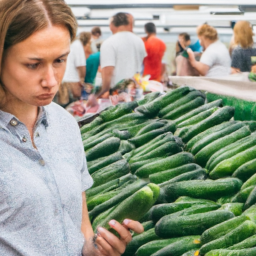The recent announcement from the U.S. Food and Drug Administration (FDA) regarding a Class I recall of cucumber products has raised significant concerns among consumers and health officials alike. This classification indicates the highest risk level associated with the recalled products, primarily due to potential salmonella contamination. In my experience, such recalls highlight the critical importance of food safety and the need for vigilance in monitoring the food supply chain. Salmonella is a bacterium that can cause serious gastrointestinal illness, particularly in vulnerable populations such as young children, the elderly, and individuals with weakened immune systems. Symptoms of salmonella infection typically include diarrhea, fever, and abdominal cramps, which can lead to severe complications in some cases. According to official reports, the FDAs decision to classify this recall as Class I underscores the serious nature of the contamination risk and the potential for widespread health implications. The cucumbers involved in this recall were distributed across multiple states, raising alarms about the potential for a broader public health crisis. Government data shows that foodborne illnesses, particularly those caused by salmonella, result in thousands of hospitalizations and deaths each year in the United States. The Centers for Disease Control and Prevention (CDC) estimates that salmonella causes approximately 1.35 million infections annually, leading to around 26,500 hospitalizations and 420 deaths. This data emphasizes the urgency of addressing food safety issues promptly and effectively. In analyzing the situation, it is essential to consider the supply chain and the processes that lead to contamination. Cucumber cultivation and distribution involve multiple stages, from farming practices to transportation and handling. Experts agree that contamination can occur at any point in this chain, often due to inadequate sanitation practices or environmental factors. For instance, if cucumbers are irrigated with contaminated water or come into contact with contaminated surfaces during processing, the risk of salmonella presence increases significantly. The FDAs recall process involves rigorous investigation and testing to confirm the presence of pathogens like salmonella. Once contamination is confirmed, the agency works with producers and distributors to remove affected products from the market. This proactive approach is crucial in preventing further spread of the bacteria and protecting public health. However, the recall process can also lead to significant economic repercussions for farmers and distributors, as they face losses from unsold products and potential damage to their reputations. As observed in previous food safety incidents, consumer awareness plays a vital role in mitigating risks associated with contaminated products. The FDA encourages consumers to stay informed about recalls and food safety alerts. In this case, consumers are advised to check their refrigerators and pantries for any recalled cucumber products and to dispose of them immediately. Additionally, proper food handling practices, such as washing fruits and vegetables thoroughly before consumption, can help reduce the risk of foodborne illness. The implications of this recall extend beyond immediate health concerns. It raises questions about the effectiveness of current food safety regulations and the need for ongoing improvements in agricultural practices. Studies show that enhanced monitoring and testing of food products can significantly reduce the incidence of foodborne illnesses. Regulatory agencies report that implementing stricter safety standards and encouraging best practices among producers can lead to safer food supplies. Furthermore, the economic impact of such recalls can be profound. Farmers and distributors may face financial losses due to unsold inventory, and consumers may experience increased prices for cucumbers and related products as the market adjusts to the recall. This situation highlights the interconnectedness of food safety and economic stability within the agricultural sector. In conclusion, the FDAs Class I recall of cucumber products due to salmonella contamination serves as a critical reminder of the importance of food safety. As experts continue to analyze the situation, it is clear that both consumers and producers must remain vigilant in their practices. The potential health risks associated with contaminated food products underscore the need for ongoing education and awareness. Moving forward, it is essential for regulatory agencies and industry stakeholders to collaborate on improving food safety standards and ensuring the integrity of the food supply chain. By doing so, we can work towards minimizing the occurrence of foodborne illnesses and protecting public health.
TRENDING NOW
WORLD
Global Messaging Trends: Can Local Apps Like Arattai Overtake Giants?
44% 🔥
POLITICS
Accusations fly over whether Republicans or Democrats 'own' shutdown
35% 🔥
POLITICS
Rep. Mike Haridopolos, R-Fla., talks about the government shutdown
34% 🔥
POLITICS
What happens now that the government has shut down. And, a pricing deal with Pfi...
26% 🔥
POLITICS
Married, but no connection: Reality of silent divorces in Indian homes
31% 🔥
POLITICS
Netanyahu's apology to Qatar, phone on Trump's lap: A telling White House photo
38% 🔥
MOST READ
SPORTS
Week 5 NFL odds, lines, betting picks, spreads: 2025 predictions: Model backs Sa...
55% 🔥
SPORTS
Predicting every undefeated college football team's first loss: Will anyone beat...
36% 🔥
SPORTS
Tigers Lefty Tarik Skubal Deserves Second Straight AL Cy Young Award
54% 🔥
SPORTS
Jets Get Official Braelon Allen Injury Diagnosis
61% 🔥
SPORTS
Gill: India won't be 'looking for any easy options' against West Indies
49% 🔥
SPORTS
Phil Mickelson takes a jibe at golf during friendly banter with ex-LIV Golf CEO’...
39% 🔥

